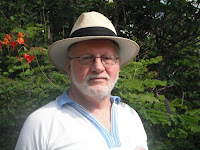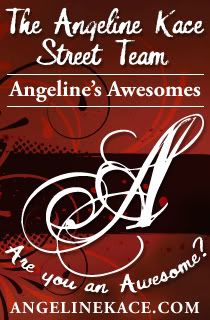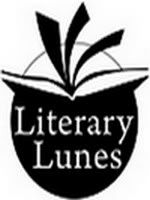Hello everyone! I hope you are all geared up for the weekend (a holiday weekend for us in the States). We have a real treat today. Mr. Phil Cantrill, the author of the amazing fantasy novel Imperial Hostage, took a little time out and answered a few questions with me. So, grab your thickshakes (explained shortly) and let's get to it!
(I reviewed Imperial Hostage back in May. In case you missed it, you can check that out HERE.)
Author Interview
Imperial Hostage: Book One of the Destruction Trilogy
By: Phil Cantrill
GL: Could you start by telling us a bit about yourself? What’s your blurb?
Phil: I was born and raised in the highlands of New South Wales, living on a mixed farm (fruit, sheep, pigs and lots of rabbits) for most of that time. With not many near neighbours apart from family, my main companions were the farm dogs – which might explain why I had to add Wolf to my story. I have always loved to read. At an age where kids these days would be playing computer games, I worked my way from Kingsley through Scott and Kipling to Capt. Johns. I guess all their tales gave me the travel bug. When I finished High School I found a job as a clerk in the local court complex. That led to me working in courts throughout the State from Sydney, west to Broken Hill and from Wyalong north to the Queensland border. Most of those names probably won't mean anything to you, but suffice to say I saw a lot of countryside in a relatively short space of time. I studied law, mostly at night, and was eventually admitted as a barrister. When I started as a lawyer I still travelled a lot, and managed to attend a few overseas conferences. I have to confess I found the people and places far more interesting than the papers presented. After working for a while as a prosecutor I answered an advertisement and found myself in Hong Kong while it was still under British rule. My contract expired a year before it was handed back to China. On returning to Australia I worked as a District Judge for a short time. I found myself increasingly restless until I decided to leave the Bar, trying to fulfil a long-suppressed urge to write. I selected fantasy as my genre because it seemed to leave more scope for imagination. Having left Law I wanted to make the separation complete.
GL: I am SO glad you added Wolf into the story! I really hope we will see him again... *hint* What an exciting and rich life you have already had!
GL: What prompted you to begin writing and why?
Phil: I've always liked writing. As a lawyer I became bored writing legal opinions and judgments. That may have spurred me to break out.
GL: What was the basic inspiration for Imperial Hostage?
Phil: Wow! Would you believe me if I said I don't know really. I think I dreamed most of it, to start with at least. I was familiar with the Plato tales and Cayce's readings as well as the endless theories about where Atlantis really was. Most of them (apart from the two mentioned) seemed to me just wild speculation. So I decided to give it a try. I avoided using the name Atlantis (though it's obvious where my main inspiration comes from) so as not to limit readers with preconceived notions. The real story is as old as mankind itself – the rise and fall of empires.
GL: What made you decide to incorporate the familiarity of the mythological/religious/historical with fantasy and technology? (I described this as Ancient Greece meets Atlantis in my review.)
Phil: I like to believe that most of the ancient tales, religious or otherwise, have some element of truth. The clash of religions is something that has also interested me. Having had a few Islamic clients from time to time I decided to read the Koran in hope of better understanding them. That in turn led me to the Analects of Confucius, the Tao Te Ching, and Buddhism. I have to say the more religious texts I read the more it seemed to me that most have become more concerned with promoting the power of Authority than truly helping their followers. I guess there's a bit of New Age philosophy in the book too – but mainly the story just seemed to flow, with my input minimal. I started out with very few preconceived ideas. “Greece meets Atlantis” of course is inspired by Plato, though I didn't want to follow him closely.
GL: Who was the most difficult character to develop?
Phil: That's a hard one. I wanted their personalities to be opposites so I could explore the ideas I just mentioned. Ai-Ram, probably, because I wanted her to be mentally strong but non-aggressive, in contrast to the other main female characters.
GL: I identify a lot with Ai-Ram. Does that make me difficult? :-)
GL: Al-Jinn is a pretty nasty fella. Was he inspired by anyone you have known? (No names necessary ;-))
Phil: Not really. I knew some pretty nasty types as a prosecutor, but none as bad as him. I wanted to portray him as being to a large extent a slave to his position, doing nasty things because they were required of him (to show weakness, after all, would mean meeting his Lord in a particularly nasty way), but plagued with increasing self-doubts without being sufficiently troubled to change his ways, if indeed he could. I don't know if I pulled it off. Probably not.
GL: I did feel at times that Al-Jinn was one of those "hopeless" cases--that he couldn't even change if he really wanted to, but you despised him no matter what. I think you pulled it off nicely...
GL: Are you more attracted to a woman that is physically superior like Myriné or mentally/spiritually unique like Ai-Ram? (Maybe I should ask who your wife is more like...;-))
Phil: I think it's safer if I plead the Fifth (if that's the right expression).
GL: *Reminded that this is a totally American phrase* :-)
The best known clause in the Fifth Amendment ("No person ... shall be compelled in a criminal case to be a witness against himself") protects suspects from forced self-incrimination. When a suspect invokes his or her Fifth Amendment right to remain silent, this is referred to in the vernacular as "pleading the Fifth."
GL: Is there an actual location that you were picturing while you were developing the Empire?
Phil: Yes. I know various researchers have “identified” Atlantis as being anywhere from Antarctica, through Sumatra to the North Pole and all points in between. I accepted Plato's description of a land “beyond the pillars of Hercules”, but I also found a report of an English university's oceanic research that discovered in the Atlantic, at a depth of three thousand metres, an area of several thousand square kilometres where the Earth's crust is said to be entirely missing. That rang the bell for me.
GL: What is the best compliment you have received since Imperial Hostage has been released?
Phil: Your and Amy's very kind reviews.
GL: Awww...shucks... :-)
GL: Who could you absolutely not have made it without during the writing/publishing process?
Phil: I thought I could write until I showed my first draft to a lady named Jenny Wagner who, apart from being an author of children's books had been a chief editor for a major publisher in Australia. She showed me how much I had to learn.
GL: Are you working on anything new yet?
Phil: Yes. Presumably you mean after the full Destruction series is published. I came across an English translation of the Persian poet Ferdowsi's “Shahnahmeh”. Having already read, many years ago, a translation of the Rubaiyat of Omar Khayyam, and the English language poem (I can't remember the author) of Sohrab and Rustum, I was blown away by the idea of writing a fiction based on his allegorical history of the early Persian kings.
GL: Sounds fantastic! I appreciate work that is completely entertaining but you can still learn something from as well. I think that's why I have always been such an historical fiction fan and why I was really impressed with Imperial Hostage. I always love when there is that historical "this-could-be-real" feel to something I read even if it is entirely made up.
GL: I know you have traveled a lot. What destination did you enjoy the LEAST? Why?
Phil: I haven't found a destination that I totally hated. There's always something interesting to see, or people to meet. But I least enjoyed once being on a tour of China where, in Xian, our tour guide announced that the price was suddenly going up. They would not complete the tour unless we paid an additional five hundred dollars each. After that we became marooned in Hangchou when China Air told us all flights were grounded, no explanation. Hangchou is a beautiful place, but appreciation becomes jaded when you're a virtual captive. Our next destination was Guangdong, where we finally learnt the reason for the delay was that the airport had been closed for two days due to fog. Then, because we had by now already overstayed the agreed length of the tour, we were all left to find our own way back to Hong Kong as best we could. China is beautiful, but that experience was not. I don't know if its attitude to tourists has improved since then.
GL: Have you ever watched The Amazing Race? I don't know if it is a big deal over there. Anyway, these people all get together and go on this crazy race all around the world--having to complete various tasks and solve riddles along the way. It seems like people have the worst time in China. I always thought they were being dramatic. Maybe not...
GL: Is there anywhere you would like to visit that you have not thus far?
Phil: Everywhere I haven't been yet, and quite a few that I have.
GL: I'm sure Huntsville, Alabama is at the top of that list!! Haha... Hey, we do have Space Camp :-D!
GL: Do you prefer being in the sky or under the water…or do you love them both about the same?
Phil: They're impossible to compare. I love the freedom of soaring for hundreds of miles with only the sun for an engine, but I love the unreal beauty of the undersea world, too.
GL: What was your favorite book as a child?
Phil: Different ages, different books. As a very youngster I liked Charles Kingsley's “The Heroes” (probably out of print now, but it had tales of the ancient Greek heroes adapted to make them suitable for children). It's from him I learned to like tales of Greece. At an older age I enjoyed Rudyard Kipling's Jungle Books (not the bastardized Disney version), then in very early teens I became enraptured by the Biggles series of Capt. W. E. Johns. I think he led me to want to learn to fly.
GL: You can find Charles Kingsley's The Heroes free on GoogleBooks. That looks like something I would really enjoy with my kids! The Jungle Books are available at little to no cost on Amazon and GoogleBooks. The Biggles books seem to be harder to come by, but you can learn more about them HERE.
GL: Who are some of your favorite authors of all time?
Phil: Wow, you know how to ask difficult questions. I'd put Isaac Asimov close to the top, but others like Douglas Adams, Terry Pratchett, Ray Bradbury, Brian Herbert, David Gemmell or Terry Brooks would be right up there, too. So would Raymond Feist. Just to show I'm not one-eyed, I like Robin Hobbs and Janny Wurts. I haven't found Jodi Picoult's or Barbara Kingsolver's stories to my taste.
GL: What is/are your favorite breakfast food(s)?
Phil: Fruit, nuts, honey and plain yoghurt in a thickshake.
GL: Thickshake - milkshake/smoothie And, my mouth is watering...
GL: What one moment in your life do you believe was the absolute most enlightening?
Phil: At my age there have been a few, I suppose. Reading an absolutely stunning phrase in a book I just picked up; talking to a stranger in a crowded bar and suddenly realizing we're both totally on the same wavelength (no, not THAT way, necessarily); climbing a mountain and, standing on the peak, realizing what a beautiful world we live in. Enlightenment comes, I think, when you least expect it, provided you're open to receive it.
GL: Beautiful parting wisdom :-)
Thank you, Phil, for stopping in and sharing with us! It has been an absolute pleasure having you, and I am really looking forward to the rest of the Destruction Series as well as your other work.
I've had the honor of chatting with Phil quite a bit recently, and he really is a charming and clever guy! If you want to know more about Phil and Imperial Hostage, head on over to JournalStone...













